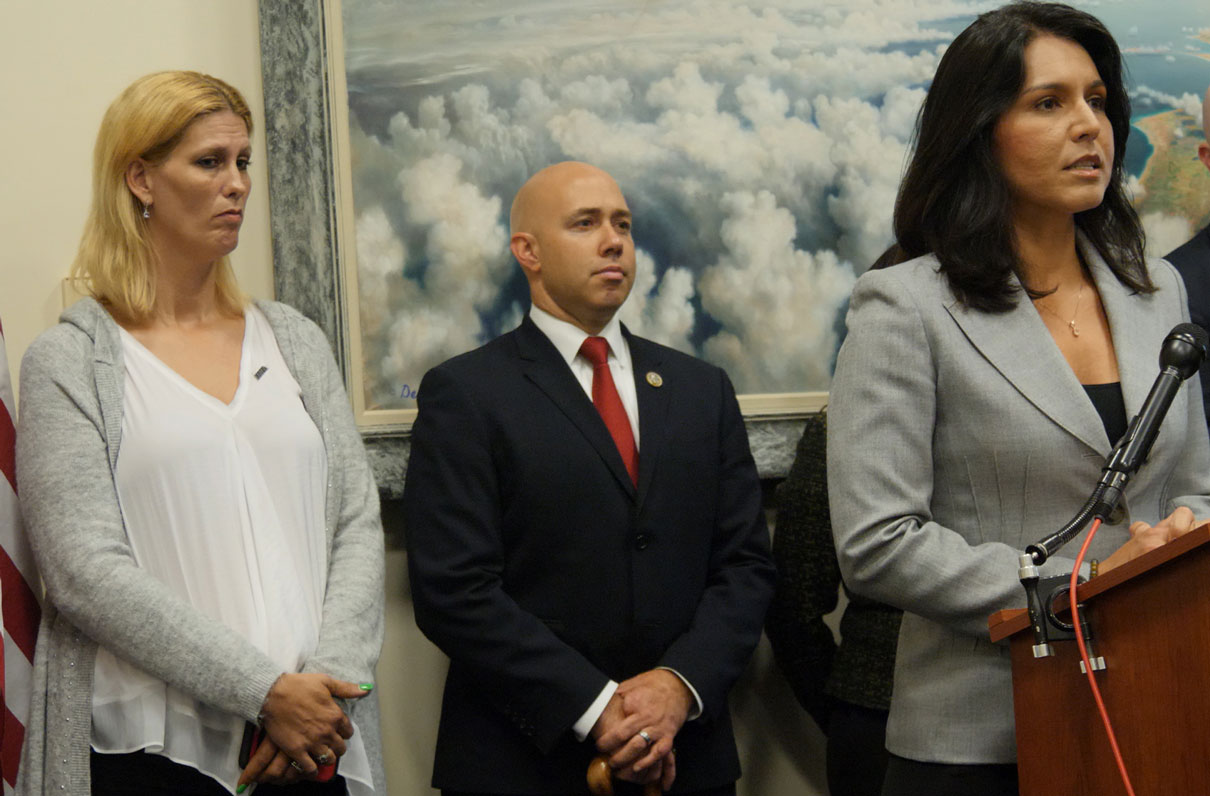Nearly every day during her 2003 deployment to Iraq, Christina Thundathil was tasked with cleaning burn pits - a duty that required her to light a fire in a large metal drum and stir waste for disposal.
She has no doubts the job made her ill, including her recent lung disease diagnosis.
As more veterans have come forward, two Army combat veterans serving in Congress - bolstered by support from MOAA and other members of the Military Coalition - are pushing a bill that would track servicemembers' exposure to burn pits or toxic airborne chemicals and share that information with Veterans Affairs facilities.
“I'm excited something can be done,” Thundathil said. “I want to leave the military in a better place than how I found it.”
On Thursday, Reps. Tulsi Gabbard, D-Hawaii, and Brian Mast, R-Fla., both Army combat veterans, came together to push Congress to unite to pass the Burn Pits Accountability Act. The burn pits issue has been compared to the Vietnam era's Agent-Orange crisis. Agent Orange, an herbicide chemical sprayed by aerial troops to destroy vegetation used for enemy cover in Vietnam, has caused illness to more than 3 million, according to government data.
The proposed burn pit bill is supported by 32 organizations that represent more than 5 million servicemembers and their families.
Retired Army Col. Mike Barron, MOAA's director of Government Relations for currently serving and retired affairs, said the proposed legislation is a significant step since it would track known issues before a servicemember leaves the military - unlike past years when veterans exposed to Agent Orange struggled to get help.
“This bill incorporates lessons learned from past failures and would enable DoD to move forward with additional support for currently serving military and veterans who develop service-related health issues,” Barron said.
Requiring a mandatory tracking system will allow the VA to take better care of veterans, Gabbard said.
“This legislation is important, it's urgent and it affects almost every single post-9/11 veteran,” Gabbard said. “I can't think of a single one of my fellow veterans who I deployed with that they didn't have some exposure to burn pits.
"They're everywhere - Kuwait, Iraq, Afghanistan. Burn pits were a part of every life."
Although not as visible as other dangers such as jumping out of aircraft or walking through minefields, Mast said exposure to toxic chemicals is just as perilous.
“This is the Agent Orange of our generation and we can't allow it to be manifesting itself in the same way that it has in the time since Vietnam where we're limping along, year after year, not doing what it takes, not fully recognizing the hazards out there for our veterans, not giving it the seriousness it deserves,” Mast said. “To not recognize those hazards is not doing justice to that servicemember."
When she was deployed, Thundathil said she'd often report to the medic station for problems with her breathing. She said she was diagnosed with bronchitis, given antibiotics and sent back to carry out her duties.
She suffered injuries from a blast in 2003 - an injury the VA fixated on, she said. She left the Army in 2004 and continued to receive treatment through the VA. Doctors were focused on her head injury and didn't pay attention to her breathing issues, she said.
Confusion over her discharge halted treatment for two years, but it was picked back up in 2012. She was diagnosed with lung disease about four years later.
There was no doubt in her mind the diagnosis was related to the burn pit details, Thundathil said. The proposed bill is one step closer to getting help for all servicemembers, she added.
“I'm very happy to see it,” she said.

